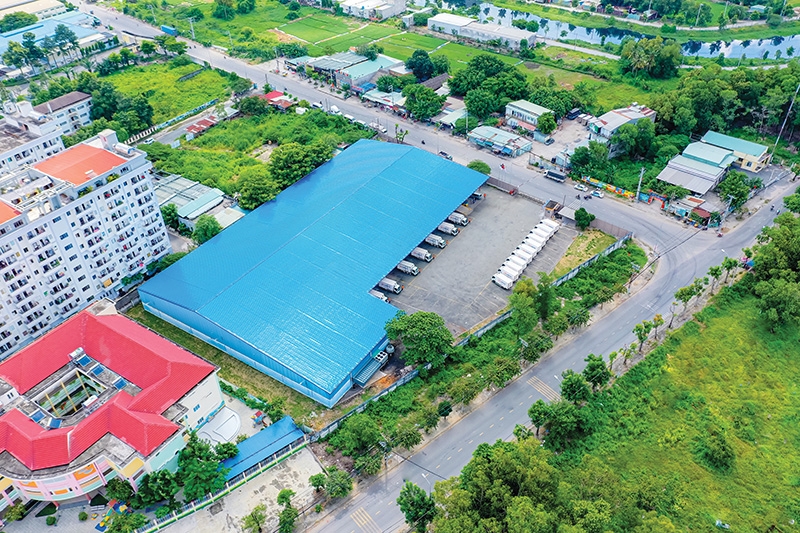Reducing food waste with apt cold chains
 |
| Advanced cold chain storage can prevent food waste and save funds, photo Le Toan |
ABA Cooltrans, Vietnam’s leading cold chain logistics provider, has officially opened a new refrigerated distribution centre in Linh Trung II Export Processing Zone in Ho Chi Minh City’s Thu Duc district. This is the group’s third distribution centre, with the others in Ho Chi Minh City and Hanoi, increasing the total area of all existing refrigerated distribution centres to about 5,000 square metres with an estimated capacity of 8,000 tonnes. With a strategic location, the new centre, worth VND250 billion ($10.76 million), is expected to meet the expanding needs of storage, distribution, and delivery for all frozen and fresh food for ABA’s customers in Ho Chi Minh City and other cities in the southeast.
Luong Quang Thi, CEO of ABA said, “With the new distribution centre, ABA will proactively ensure the business continuity plan for customers during COVID-19’s difficult times. Also, this development marks a breakthrough in ABA’s ability to meet the rising demand for food safety for consumers, towards the realisation of our 2023 vision and ABA’s mission for food safety in Vietnam.”
In recent years, the modern food retail industry has developed rapidly, mainly thanks to Vietnam’s strong economic growth and an increasing middle class concerned about food hygiene and safety. Thus, the cold chain industry is also growing at an estimated 15-20 per cent per year.
Therefore, ABA has plans to open more such centres near consumption areas and large urban areas to accompany the burst of customers and market demand.
Along with local players, the market recorded aggressive expansion of foreign ones to the cold storage segment. In May 2019, Japanese transportation company Ryobi Holdings acquired a 35 per cent stake of Amerasian Shipping Logistics (ASL), a freight forwarding and logistics company, for an undisclosed amount. The investment aims to develop the cold chain logistics segment in Vietnam.
In the next three or five years, Ryobi Holdings plans to invest in ASL to develop cold transportation, storage, and distribution of agricultural and seafood products, both in Vietnam and across Southeast Asia. Meanwhile, ASL will focus on developing refrigerated containers and trucks and handling customs declaration and international carrier to transport goods from Vietnam to Southeast Asia and Japan.
Vo Thi Phuong Lan, chairwoman of ASL, said that Ryobi Holdings has more than 100 years of experience transportation, warehousing, and modern technology management. This, coupled with ASL’s local understanding, will help the tie-up reduce logistics costs for local producers and improve competitiveness of Vietnamese goods in export markets.
Meanwhile, CLK Cold Storage Co., Ltd. was established in Vietnam in 2015 as a joint venture between “K” LINE, Cool Japan Fund Inc., and Japan Logistic Systems Corporation. The joint venture is currently operating Vietnam’s first four-temperature-zone warehouse with various cargo damage prevention and energy-saving features.
With the investment capital of around $18 million, the CLK cold storage warehouse covers a total area of 9,300sq.m and is located in the southern province of Binh Duong.
According to a report by Fiinpro, an application-based platform providing financial database, the cold chain is one of the most promising logistics segments for growth in Vietnam due to soaring demands from retail and food and beverage sectors, creating opportunities for both local and international companies to tap in.
In light of the development of modern trade system in Vietnam, the demand for cold transportation is increasing quickly, the report added, and the investment cost for this area is relatively lower than cold storage while profit margins are higher. As a result, cold storage companies are expanding their business to cold transportation services.
The development of the cold chain industry is also expected to reduce food losses after harvest. According to a CEL Consulting report in 2018, on average 25 per cent of what is produced is lost before it actually reaches processing plants or distribution centres.
What the stars mean:
★ Poor ★ ★ Promising ★★★ Good ★★★★ Very good ★★★★★ Exceptional
Related Contents
Latest News
More News
- Hermes joins Long Thanh cargo terminal development (February 04, 2026 | 15:59)
- SCG enhances production and distribution in Vietnam (February 04, 2026 | 08:00)
- UNIVACCO strengthens Asia expansion with Vietnam facility (February 03, 2026 | 08:00)
- Cai Mep Ha Port project wins approval with $1.95bn investment (February 02, 2026 | 16:17)
- Repositioning Vietnam in Asia’s manufacturing race (February 02, 2026 | 16:00)
- Manufacturing growth remains solid in early 2026 (February 02, 2026 | 15:28)
- Navigating venture capital trends across the continent (February 02, 2026 | 14:00)
- Motivations to achieve high growth (February 02, 2026 | 11:00)
- Capacity and regulations among British areas of expertise in IFCs (February 02, 2026 | 09:09)
- Transition underway in German investment across Vietnam (February 02, 2026 | 08:00)

 Tag:
Tag:




















 Mobile Version
Mobile Version